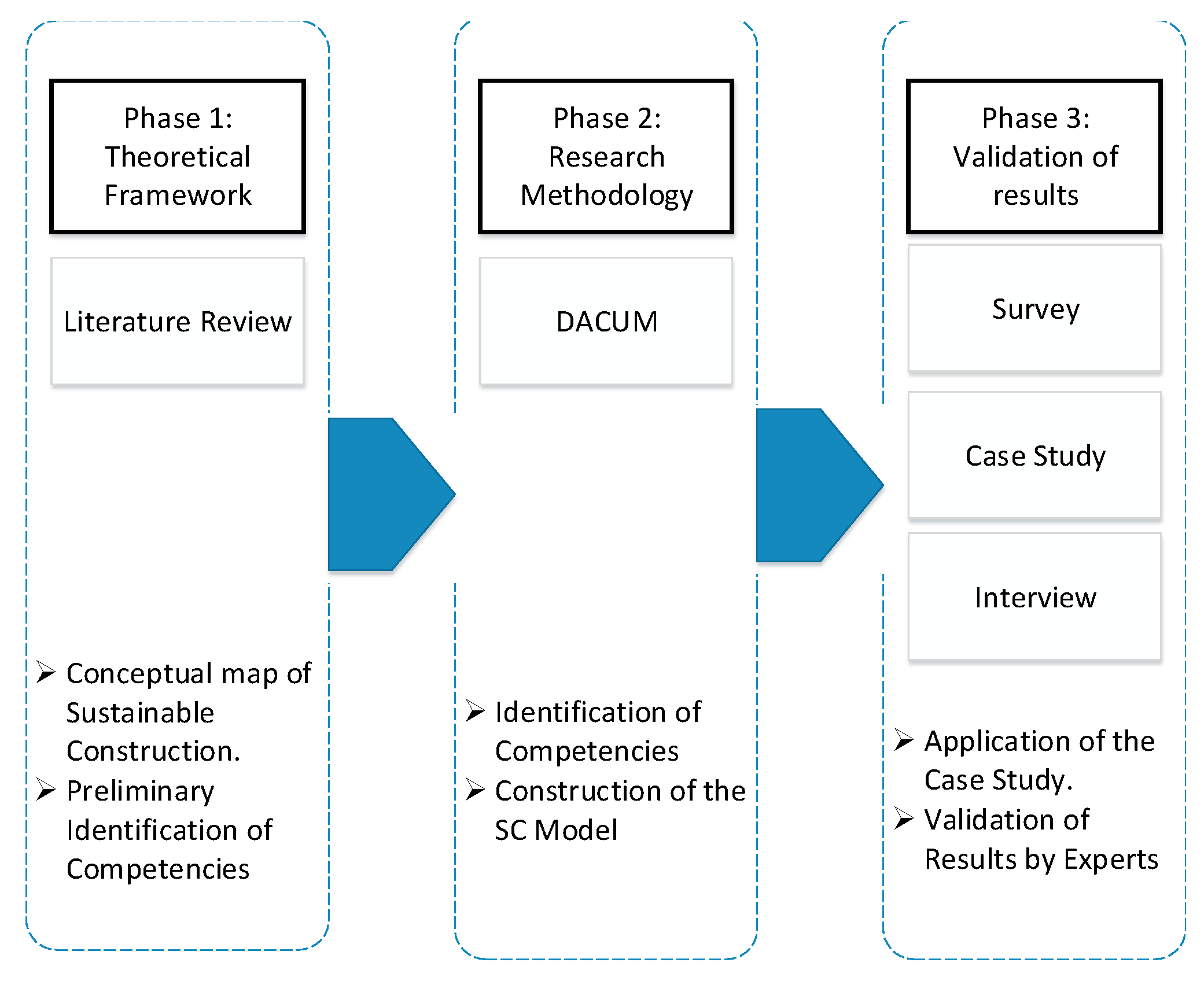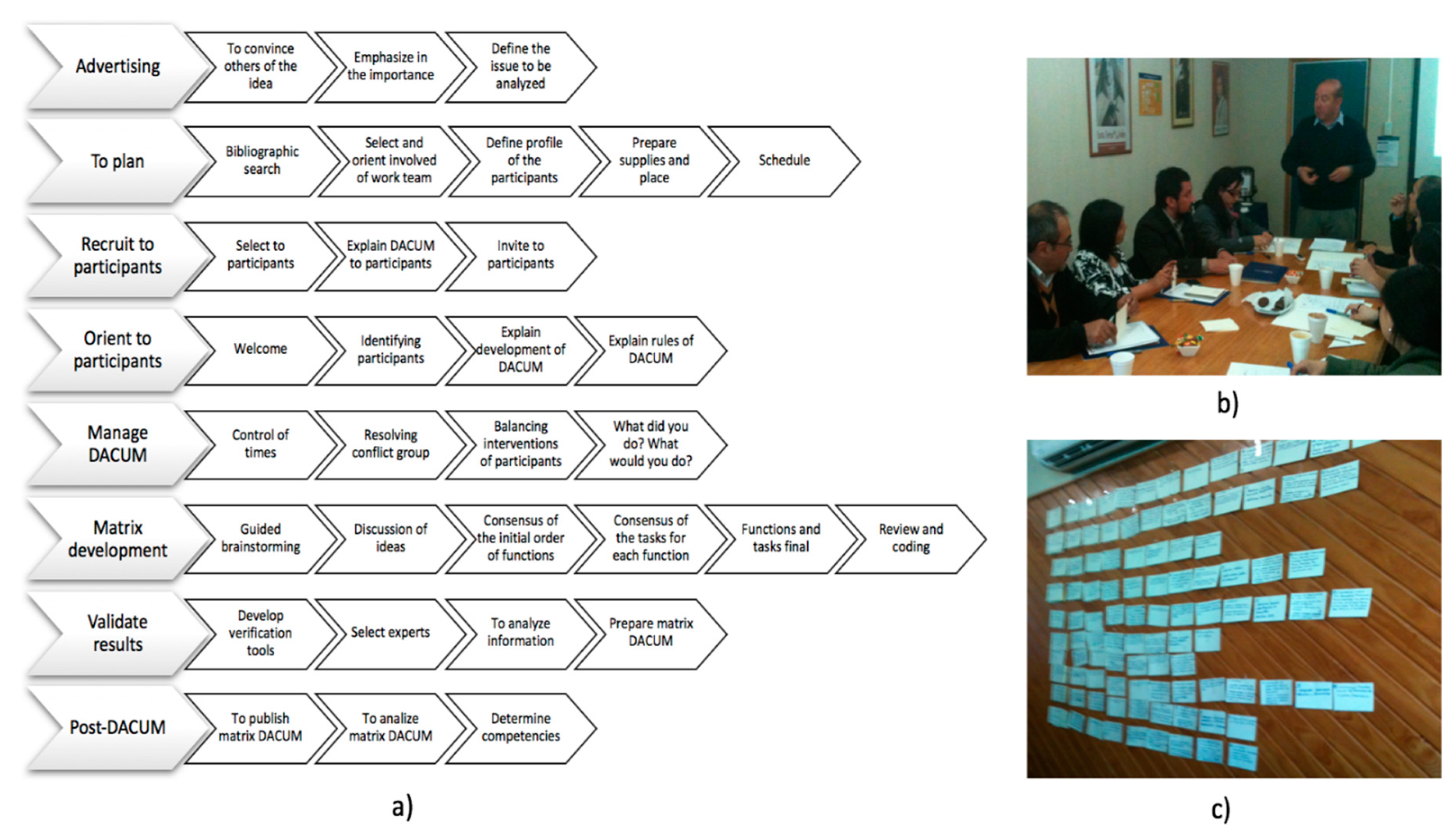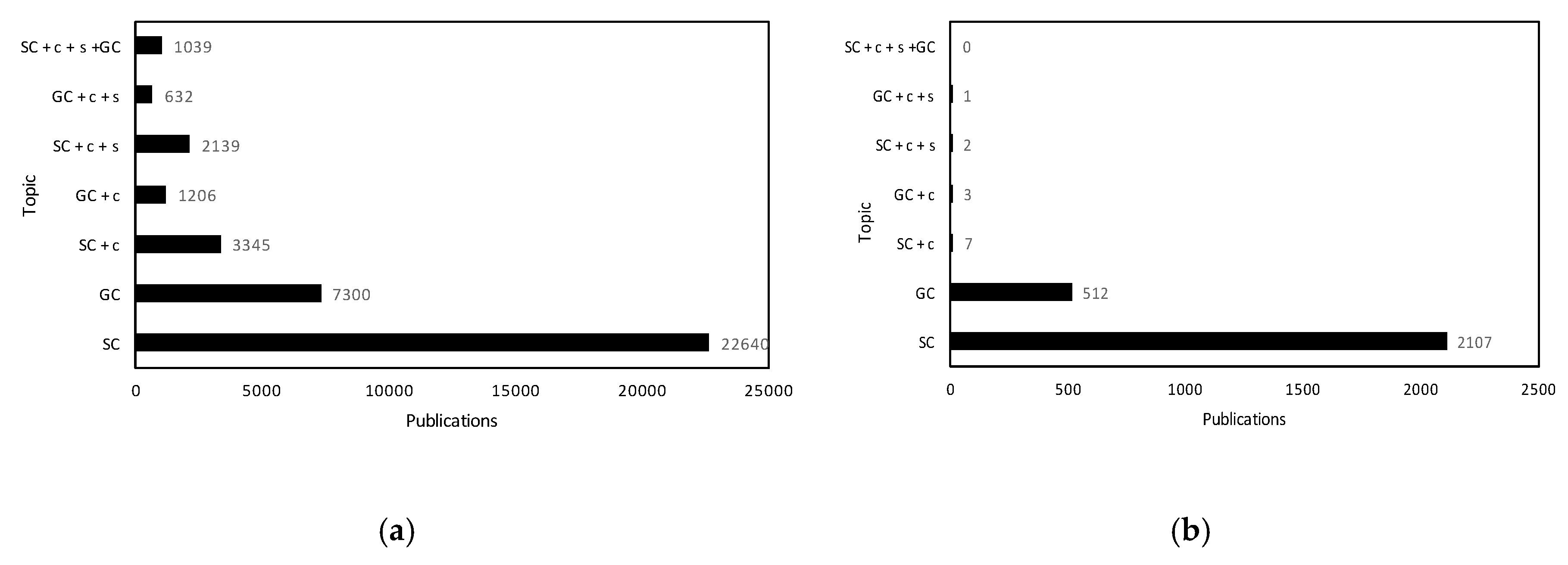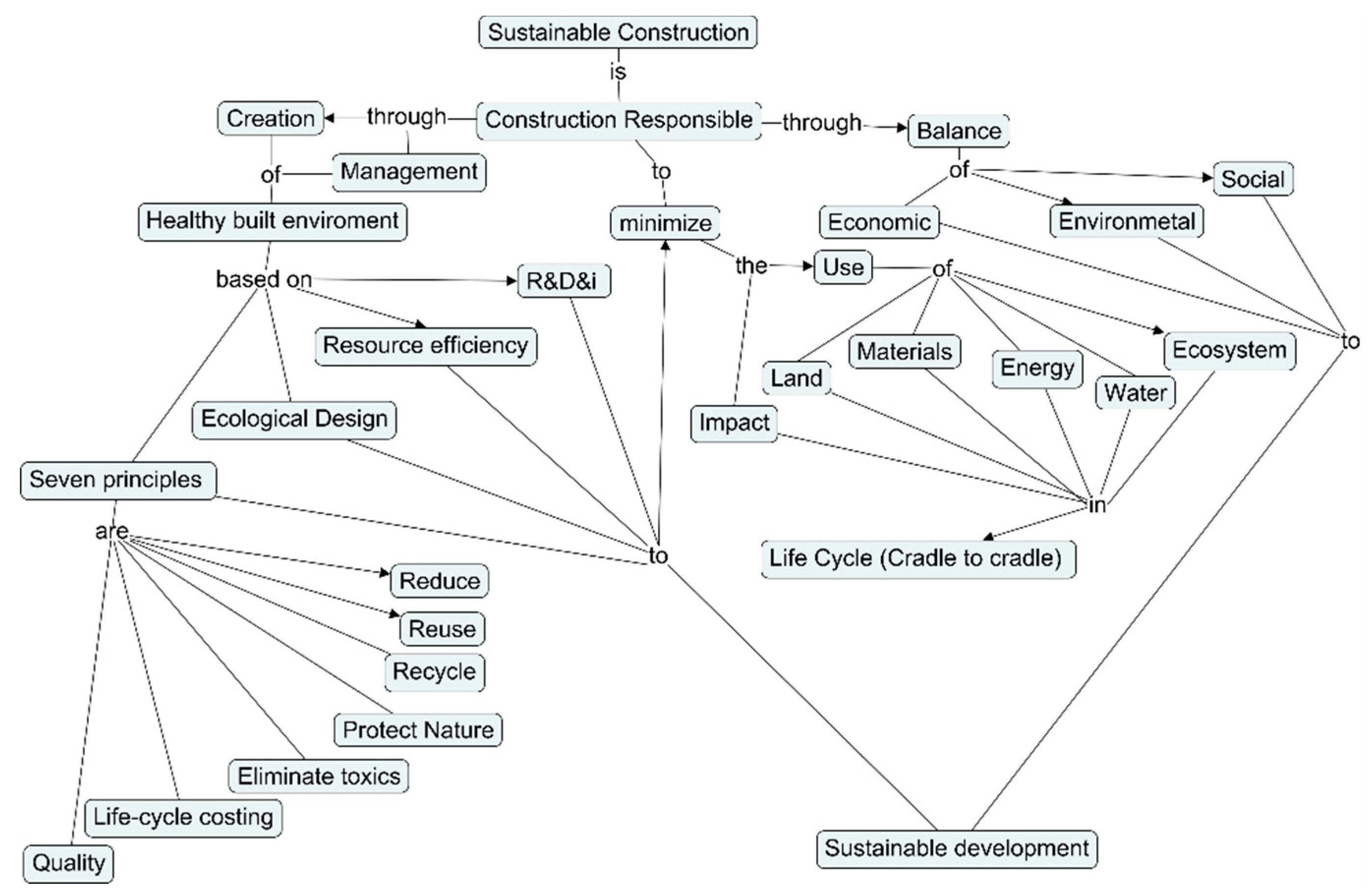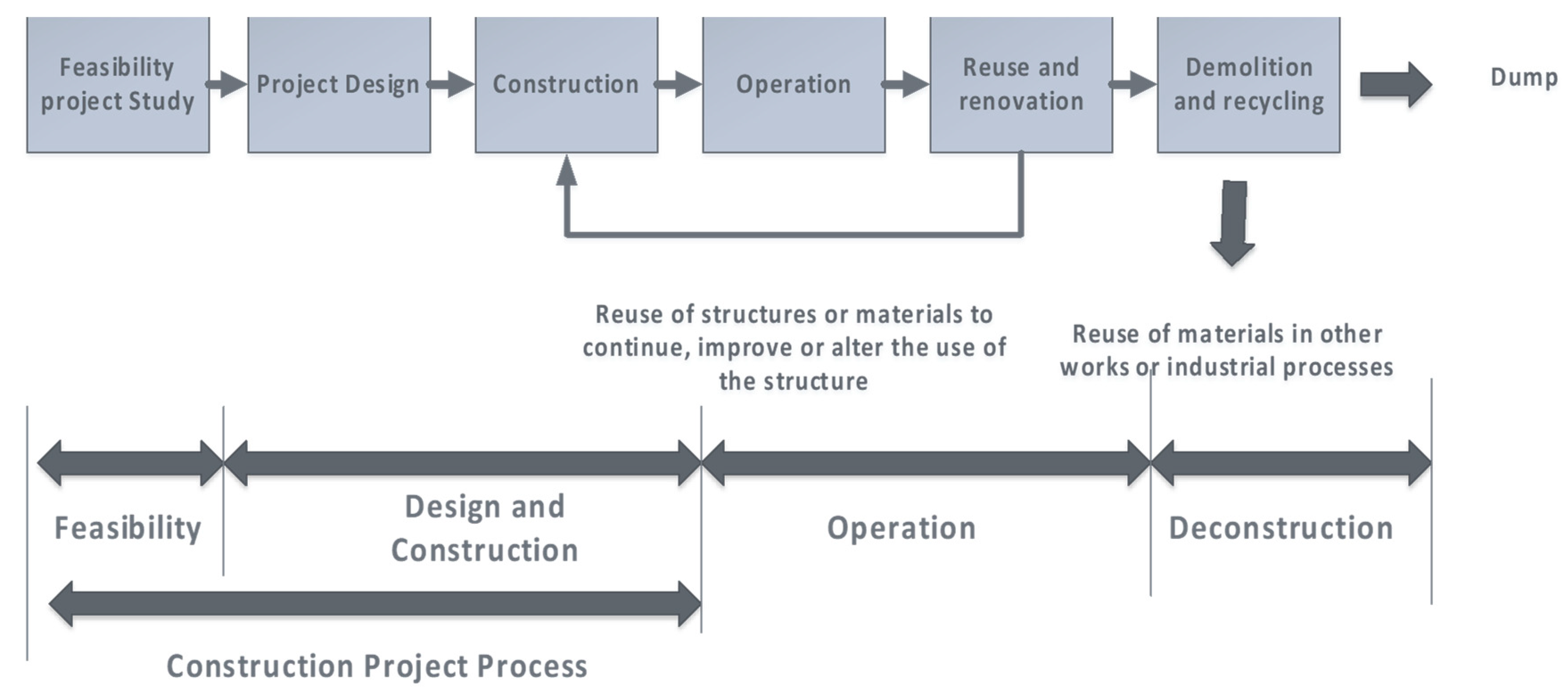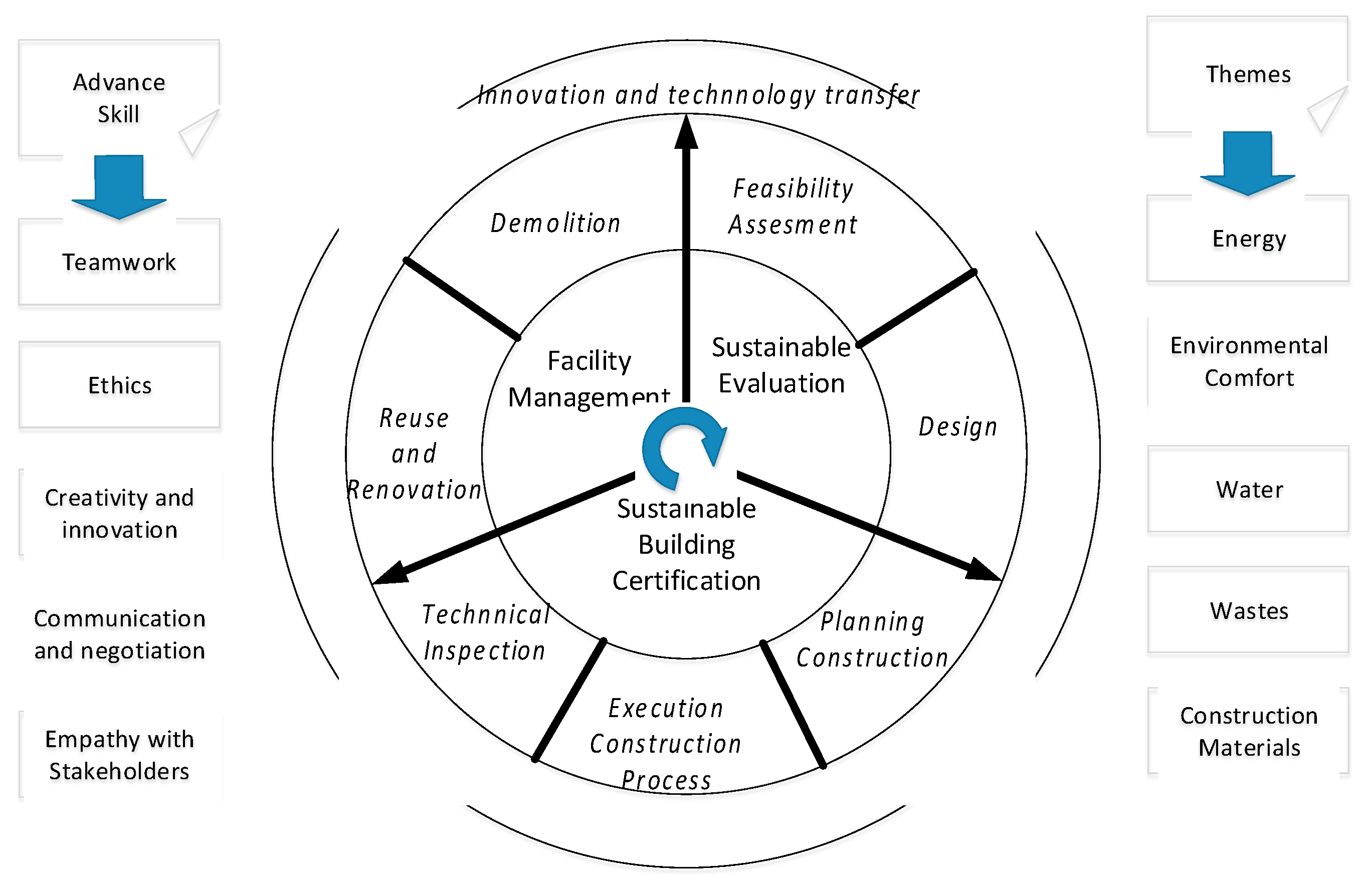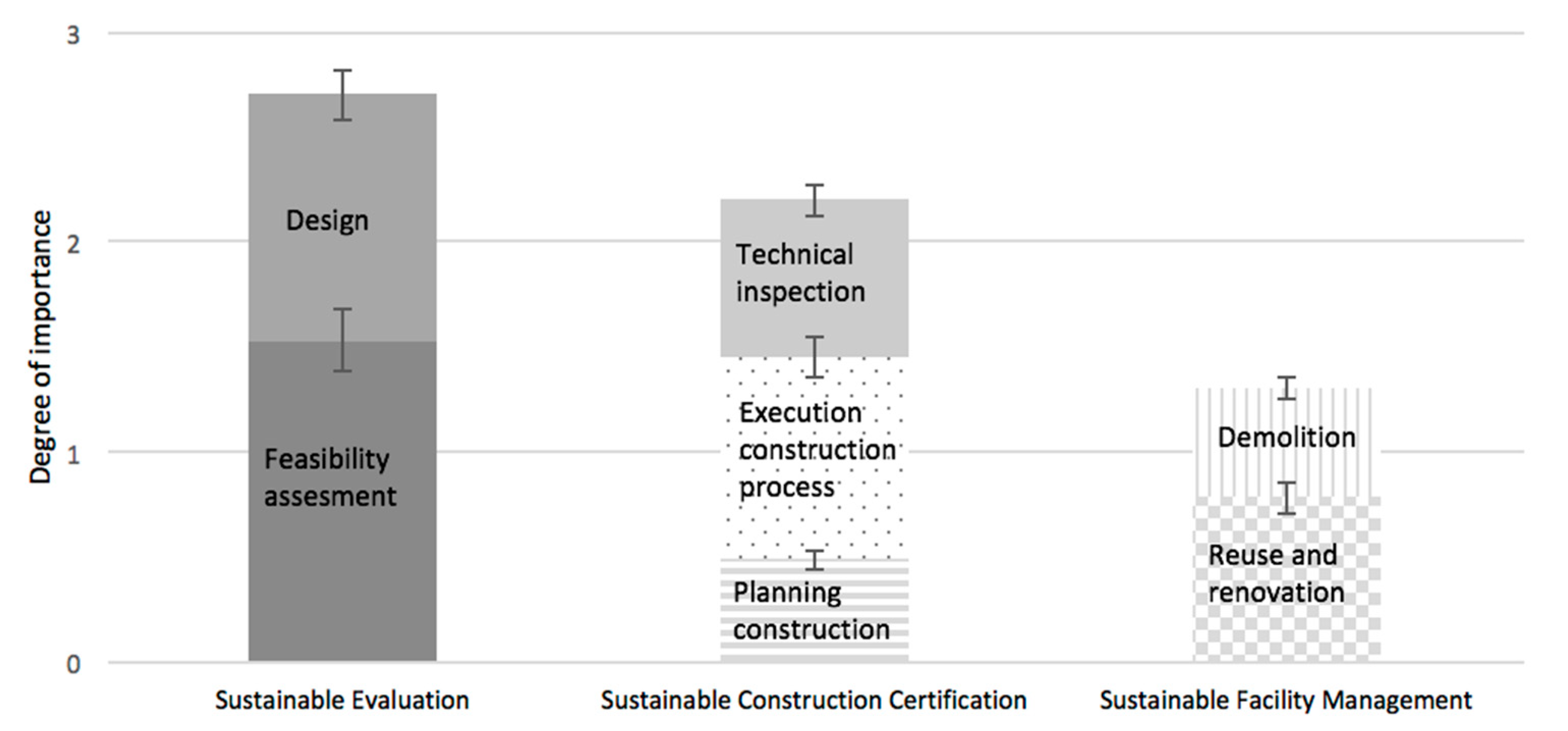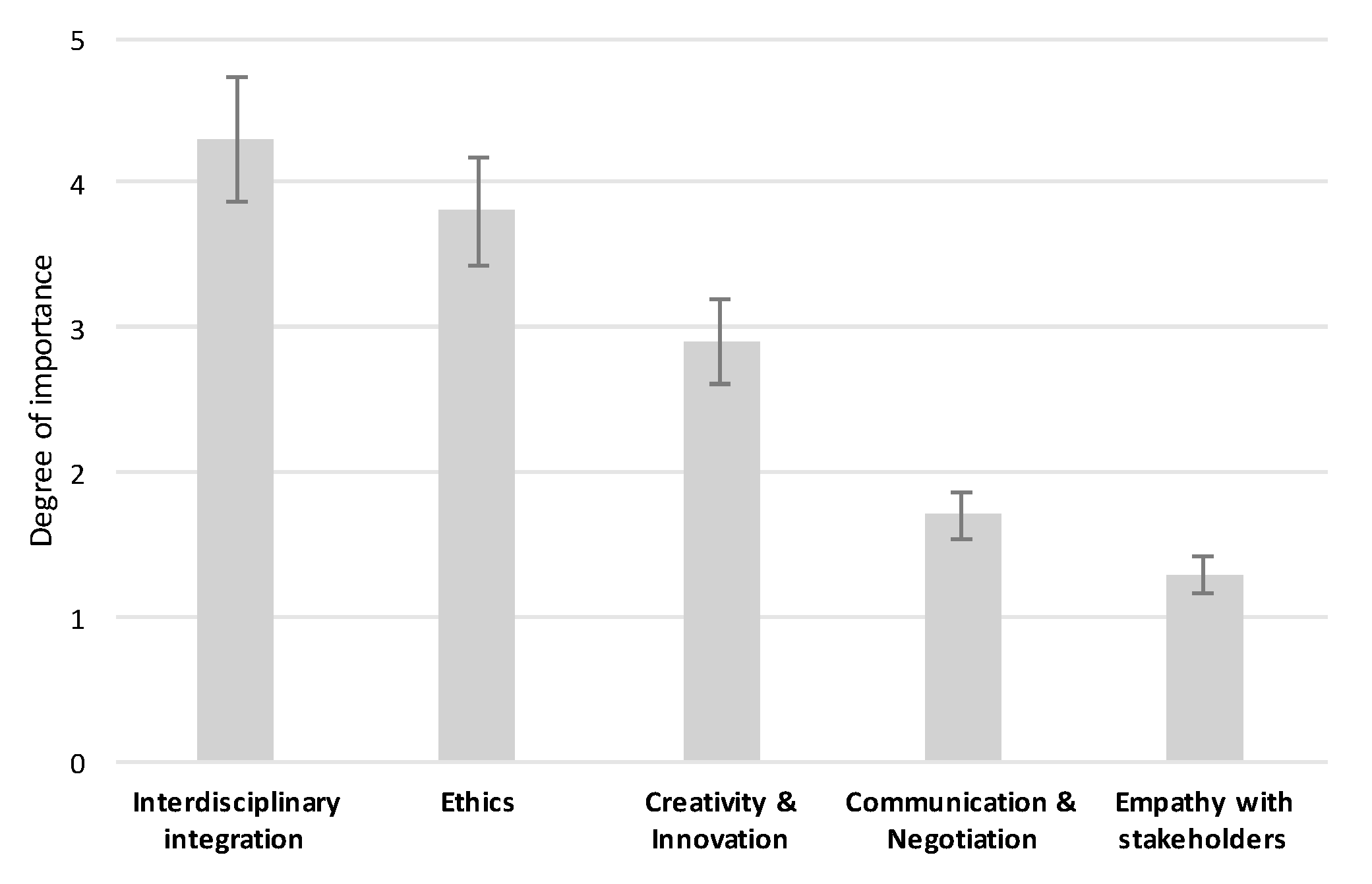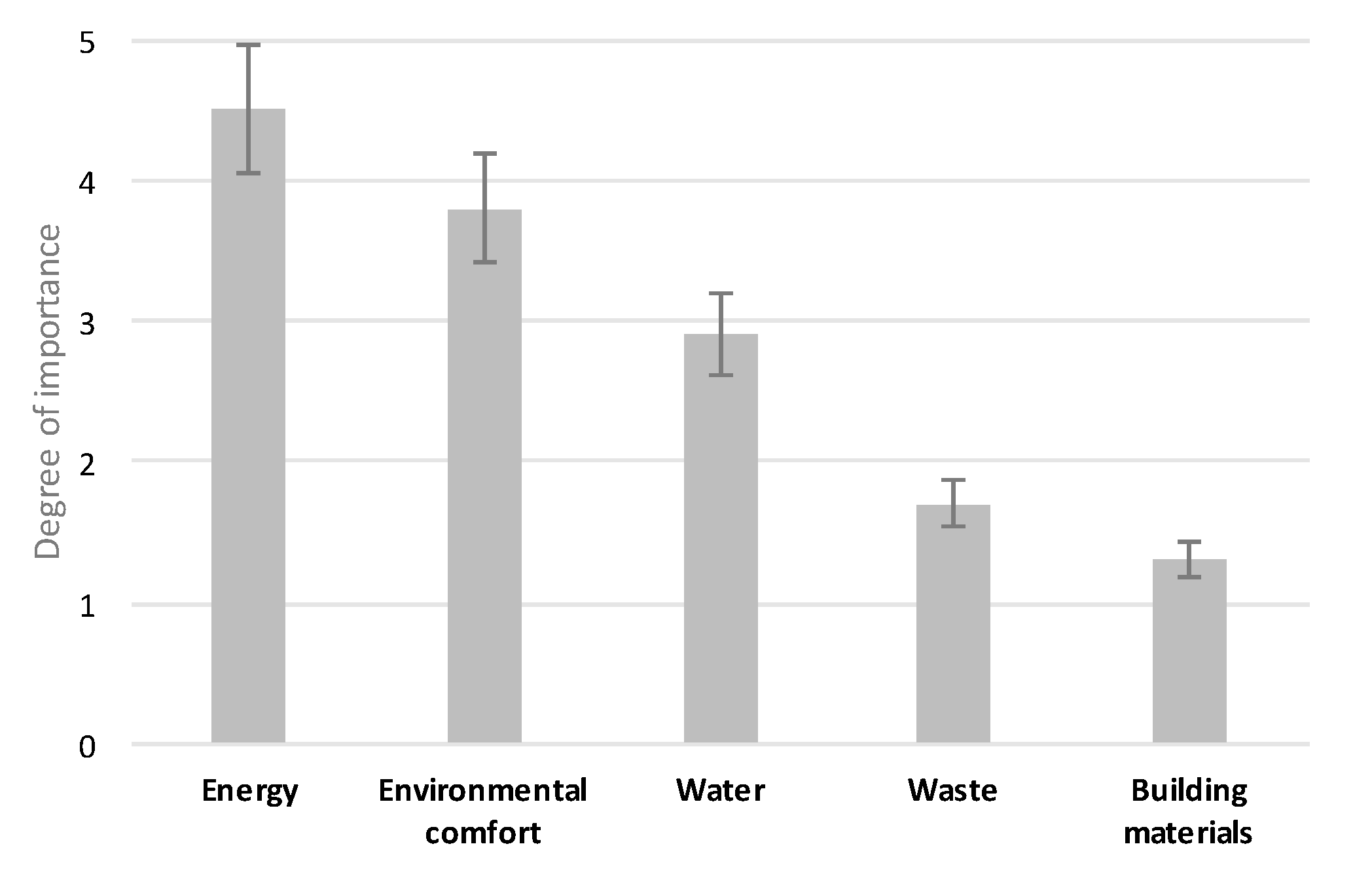Abstract
The training of engineers in sustainable construction (SC) is becoming increasingly studied, since sustainable construction not only improves the quality of life of people, but also provides comprehensive solutions to the environmental problems we face today and thus takes care of the needs of future generations. This research is in line with the National Strategy for Sustainable Construction (NSSC) from the Chilean Government. One of the NSSC challenges is the training of engineers capable of adapting to the SC requirements. Although the competences in sustainability for the training of engineers has been discussed in other researchs, it has not been specifically in sustainable construction and it have not been grouped in a model that considers their degree of importance. The purpose of this article is to present a conceptual model can be used to design and evaluate engineering training programs in SC. The methodology to establish the skills and the proposed training model consists of three stages: Theoretical Phase, Methodological Phase and Validation Phase (surveys and interviews). 113 professionals who performed activities related to SC answered the survey. Interviews were conducted with five experts in training in different SC aspects. Three global skills are identified as: Sustainable Evaluation, Sustainable Construction Certification, and Sustainable Facility Management. In addition, the degree of importance of skills associated with these global skills was identified and assessed. There are five skills necessary for the future engineer, among them, two stand out: teamwork (collaborative) and ethics. Finally, the order of importance of the topics in SC is: energy, environment comfort, water, waste, and construction materials. A future investigation is recommended to apply the proposed conceptual model to current engineering training programs, both national and international.
1. Introduction
The growing complexity of the construction industry forces professional engineers to evolve and adapt [1]. Currently, civil engineers must devise viable solutions that are affordable and in line with society’s aspirations, contributing to: economic growth, environment protection and a better quality of life. To achieve these objectives, the solutions must reach a balance in terms of: costs, benefits, quality and acceptability within the legislative framework, and involve the concepts of life cycle costs that represent both the economic viability of the engineering project and its long duration in terms of tangible and intangible environmental impacts [2]. Therefore, there is an urgent need to incorporate sustainability and social commitment into the engineering curriculum [3]. For this reason, many authors [4,5,6,7,8,9,10] have researched pedagogical strategies to develop the competences and skills related to sustainability in engineering students. For example, de la Riva et al. [11] implemented a sustainability course for engineering students. They designed an innovative course combining lectures, workshops, and academic curricula with a character curriculum education, outdoor activities, and community works in a creative and stimulating academic learning. Helen Brain and Thomas [12] implemented Communicating Sustainability course explored the deeper meanings of sustainability, and students learned about their own beliefs and behaviors, their community, and how to act as professional change agents. The course was structured around exploring the theoretical foundations of sustainability, communication and conservation theories, and communication techniques. Forment et al. [13] created a knowledge base that brings together scientific articles, books, videos, compilations of data, experiences, etc., related to sustainability and knowledge areas associated with computer science engineering. This is a tool that should provide to the teacher accurate and useful information in the research task of finding links between her course and the “Sustainability and Social Commitment” skill. This article explores sustainability, specifically the sustainable construction area.
The new paradigm of sustainable construction (SC), the globalizing tendencies that are taking place in current societies and the need to face the increasing complexity and uncertainty present new challenges that require the acquisition of new skills in engineers of the building sector. SC is about creating and operating a healthy built environment based on resource efficiency and ecological design [14]. Its objective is to achieve a balance between the economic, social, and environmental dimensions (triple bottom line) [15]. The solutions that emphasize SC are: (a) the ecological materials used to reduce the material and energy demand in the building construction and operation [16,17,18,19,20,21,22], (b) to achieve the thermal comfort of the inhabited place [23,24,25,26,27,28] and (c) to achieve energy efficiency in buildings [29,30,31,32,33,34].
Today, the SC takes importance due to its contribution to tackle with climate change and its positive link with the efficient use of energy [16,35,36,37,38]. Governments have proposed various measures to support sustainability issues, energy efficiency and everything related to the environment [39,40,41]. Specifically, in Chile, in August 2012 a collaboration was established between four Ministries (Public Works Ministry, Housing and Urbanism Ministry, Energy Ministry and Environment Ministry) to coordinate promote, and publicize the SC in the country. This agreement establishes the guidelines to integrate the concept of sustainable development in construction and will serve to position the country at the regional level in 2025. The NSSC coordinates and links current energy and environmental plans that have been developed in parallel in different government agencies. In this sense, the strategy is established as a tool to coordinate the different actions, goals and objectives in the short, medium and long term. This strategy is composed of four areas that develop the priority issues for the SC advancement in the country: (a) Buildings and infrastructure with sustainability considerations to 2020, (b) Commitment by the Commercial, Public and Residential sector to reduce energy consumption by 12% (projected to 2020), (c) Reduction of 20% of greenhouse gases by the construction industry, based on projected emissions to 2020, (d) 10% of the energy generated by unconventional renewable sources by 2024 will be contributed by the construction sector [42]. In this sense, the authors contribution towards the NSSC is through the project called “Professional formation strengthening of engineers in sustainable construction and energy efficiency in the Maule región” This project allowed the execution of this rearch.
The inclusion of the concepts, criteria, and tools of the SC in the construction sector requires its dissemination and application by all the agents of the project-construction process. In this sense, the training of professionals and technicians in SC is fundamental. Although the sustainability issues are widespread, there is a lack of information on the role of engineers in sustainability [43]. Researchers have begun to develop, identify, and delineate key sustainability competencies [44,45,46,47,48].
According to Aznar and Ull [49], the term competence generates a change in the way of understanding the human learning. The definition of skills is a complex and diffuse concept with psychological roots [50] and linguistics [51]; Bunk [52], notes that being competent is the one who has knowledge, skills, and attitudes necessary to practice a profession, can solve professional problems in an autonomous and flexible way and is qualified to collaborate in their professional environment and work organization. Several authors classify the skills [53,54,55]. The basic division of the skill types are: “knowledge”, “knowing how to do” and “knowing how to be” [53].
The competences and skills developed in the sustainability field in engineering students have been assessed by different authors [56,57,58,59,60]. Chandu and Kancharla [61] highlight the process of identifying the skills required for sustainability, problems in curriculum design, implementation and impediments for sustainability in engineering education. Thus, it is important to specify the study in the sustainable construction competences and skills.
Finally, based on the context of Chile, the aim of this article is to determine the engineer’s competences and to present a conceptual model to design engineering studies programs in SC. This model allows the formation of the new generations which is not a random process, but it will be based on a planning design and continuous improvement of the study programs. This work is divided into the sections: methods, results and conclusions. The methods explain the methodology for identifying competencies and skills in sustainable construction. The results analyse the sustainable construction area and a conceptual model involving competencies, skills and issues is proposed. The conclusions establish the conceptual model application and its projection for future research.
2. Methods
The proposed methodology (see Figure 1) to establish the skills and the SC formation model consists of three stages: Theoretical Phase, Methodology Phase and Validation Phase. The methodology is for SC training in higher education.
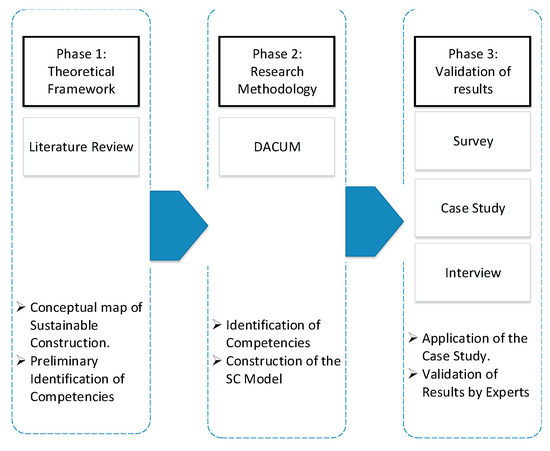
Figure 1.
Research methodology (three stages).
Stage 1 is based on a systematic literature review [62,63,64] to establish the SC concept and the preliminary skills. This search was made in Google Scholar, Scopus and Web of Science for the 2012–2017 period. The search strings used were “sustainable construction” or “green construction” used simultaneously with “competence” or “skill”. The search was filtered at the intersection of “sustainable construction” and “skill”. These words were searched in the title, keyword and abstract of articles published in peer-reviewed journals. A total of 52 articles were found. The 52 articles were read by two of the authors and categorized as relevant or irrelevant. A total of 32 articles were classified as irrelevant by the authors and were eliminated. From literature review, it was decided to use the SC concept by Kibert [14] to preliminarily guide the work with the experts in Stage 2.
In Stage 2, the SC model was constructed based on the execution of the method Developing a Curriculum (DACUM), since it aims to analyse the job position and the task to define the training curriculum [55,65]. The application of this method involved a facilitator and a committee of 15 expert workers from the construction area. These experts are a part of the academic, companies, and government. The matrix of the resulting profile is a detailed and graphic description of functions and tasks, performed by the involved experts [66]. The functions and works of the study were performed following the procedure (Figure 2) based on the steps established by the Center of Education and Training for Employment College of Education from Ohio State University, United States [66]. The DACUM method has been applied in engineering education in different countries, which is demonstrated by a search of the topics “DACUM” + “engineering” in Science Direct and scopus, resulting in at least 23 articles. Once the DACUM is done, the skills are determined with the methodology described by Tobón [67,68], where the skills are identified based on functional analysis. The criteria defined by Tobón [67,68] for the skills units description were followed. Then, a Conceptual Sustainable Construction skills model of professionals in the construction area is elaborated.
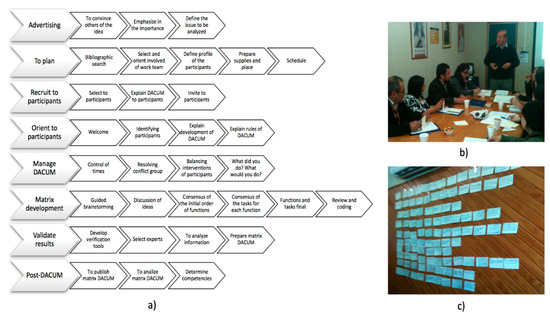
Figure 2.
(a) Diagram of the DACUM procedure, (b) Photograph about orient to participants, (c) Photograph about matrix development.
Finally, Stage 3, a survey of certified professionals on SC (Table 1) is performed to firm up the results of the DACUM methodology and the Conceptual Sustainable Construction skills model. The Housing and Urban Planning Service of the Chilean Government validate these certifiers in the SC area. The survey was sent to 449 certifiers. The number of surveys answered randomly was 113; of these, 65% corresponds to professionals who work in a company, 23% in government and 12% in universities. Self-employed certifiers were not considered since 45% of them have ceased to perform housing certifications and 55% are not permanently engaged in housing certification activity. Therefore, the certifiers surveyed population is 138. The survey questions allow to correct and firm up the DACUM results, as well as to determine the degree of importance of: global competences, skills, advanced skills and topics. The degree of importance is based on a scale from 1 to the largest number of items, 1 being the least important and was not allowed to repeat the same value in another item.

Table 1.
Profile of the professionals surveyed and interviewed.
The stratified sampling study and the survey exploratory factor analysis (EFA) with the internal consistency evaluation (Cronbach’s alpha) was carried out by using the SPSS v22 software. This process was performed first, to show that the sample of respondents is representative and second, to show the survey reliability. The population segment in the stratified sample is determined by the location the surveyed professionals perform their sustainable construction tasks. The EFA analysis considered the graphical criteria in the orthogonal rotation (Varimax) and the Kaiser criteria (eigenvalue > 1).
Additionally, the survey validated the subskills (Table 2) that will translate into learning units in SC. Many of these sub-skills are at the intermediate and higher levels of knowledge, e.g., analyse, evaluate, explain, apply, optimize and management. This is the level of knowledge in sustainable construction that higher education trained engineers are expected to achieve. Then, five interviews to experts in the area are performed (Table 1) to correct the details of the proposed conceptual model. The interviews were semi-structured, as defined by Hernández et al. [69], since it is better to collect information that largely facilitates feedback. These interviews lasted at least 30 min. The willingness of the experts to share their knowledge to establish the skills and competences is appreciated.

Table 2.
List of subskills needed for training in SC.
3. Results
In higher education, engineers must be trained in SC with a clear and precise conceptual basis. Thus, it is vital to consolidate an extensive bibliographic review of the subject. Figure 3 shows the accessed number of publications related to the topic. Based on the literature review, the SC definition considered by Kibert [70] is: the creation process and responsible management of a healthy built environment based on ecological principles and resource efficiency. This is reinforced by Shen et al. [15] that the SC aims the triple bottom line. Figure 4 represents a conceptual map that was developed with the information collected from the literature review.
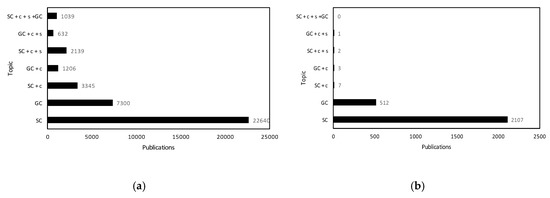
Figure 3.
Publications searched in (a) scholar, (b) scopus and WoS. Search topics: sustainable construction (SC), green construction (GC), competences (c) and skill (s).
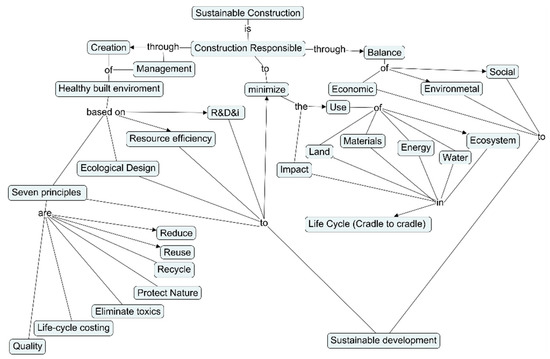
Figure 4.
Sustainable construction conceptual map.
Thus, in the conceptual map, seven SC principles are highlighted: Reduce resource consumption (reduce), Reuse resources (reuse), Use recyclable resources (recycle), Protect nature (nature), Eliminate toxics (toxics), Apply life-cycle costing (economics) and Focus on quality (quality); they are applied to the entire construction life cycle (see Figure 5) [71] in order to minimize the necessary resources (land, materials, water, energy and ecosystems) in the creation and operation of the built environment [70].
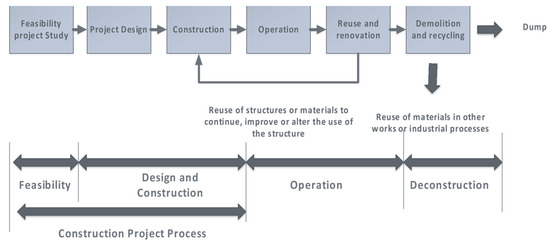
Figure 5.
Outline of the sustainable life cycle of construction project.
In the life cycle, the innovation and technology transfer are the key factor in terms of commercial success and to introduce sustainability within the administration and therefore, within the companies’ strategic objectives and decision making [72,73]. Technology innovation and transfer allows consultant and construction companies to incorporate into their activities, the principles and tools for their communities’ sustainable development.
Management of a healthy built environment and sustainable management of a construction project requires project managers to be transformed into sustainable development specialists and act as partners and stakeholders pairs (stakeholder) [74]. Thus, the management and creation of a healthy built environment implies more than a design for the environment; it must integrate social, economic, local, and regional aspects. Achieving a healthy environment based on the efficiency of resources in the SC requires considering local regional variables due to the differences in the economic development and quality of life of the communities. Mainly, it is necessary to evaluate the characteristics of the inhabited place and its integration with the community to optimize the use of resources and eco-efficiency ensuring the proposed infrastructure’s quality, economy and durability throughout the life cycle (see Figure 5) [29,35,75,76]. Thus, offering opportunities for participation and self-identity expression over large-scale consumption of standardized product [77]. The study of feasibility, as part of the project, should allow a greater focus on methods and tools that improve project quality, safety performance and the environment [15]. In consequence, project sustainable management must guarantee the delivery of profitable, fair, transparent, safe, ethical and environmentally friendly projects, with the objective to achieve a product that is socially and environmentally acceptable throughout its lifecycle and at the same time obtaining competitive advantage and economic benefits for construction companies [15].
Boveas and Perez-Belis [78] mention three typical aspects for optimizing the product ecological design process: (a) incorporate the environmental aspects to the product and to the development process from the beginning; (b) focus on the life cycle; and (c) multicriteria approach, given that the environmental and traditional criteria must be considered simultaneously. Therefore, for the sustainable materialization of a work, it is required: reduce the impact on the extraction of energy resources and raw materials, consider the construction conditions to ensure that a minimum environmental impact, the structure’s durability, the aptitude for deconstruction, efficient construction logistics, safe working conditions and reducing construction pollution in the workplace and its surroundings [79].
On the other hand, a SC is expected by balancing a triple base model. This means that the companies must adopt a broader, longer-term vision that allows them to be moved from a transactional mindset to a trust-based development, which is mutually beneficial and lasting relationships with the internal key and external stakeholders [80].
Given the information gathered in the literature review that was consolidated in the conceptual map (see Figure 4), the necessary skills needed in SC were identified. Then, the DACUM method is performed, complying with what was described by Borges et al. [81]: the expert workers can describe and define their work/occupation more accurately than anyone else and all tasks, to perform them correctly, demand the use of certain knowledge, skills, tools, and positive workers’ behavior. The DACUM method determined: (1) the key mission or proposal for the area studied: “Train engineers to perform the necessary skills in the SC area, based on the updated theoretical framework and legal framework”, (2) the first level functions that the professionals must perform to achieve that purpose (Table 3) and the related functions classified as successive levels. Then, each generated skill from the functions that answer the questions: What is needed to fulfill it? Or How can it be achieved? For a higher level of competition. The skills are written using Bloom’s taxonomy [82]. Once the DACUM method is done, it is validated with expert surveys and interviews with specialists. This information together with the valid test can be defined as: the global competences, skills, sub-skills, advanced abilities and priority issues (Figure 6).

Table 3.
Engineers’ functions in sustainable construction.
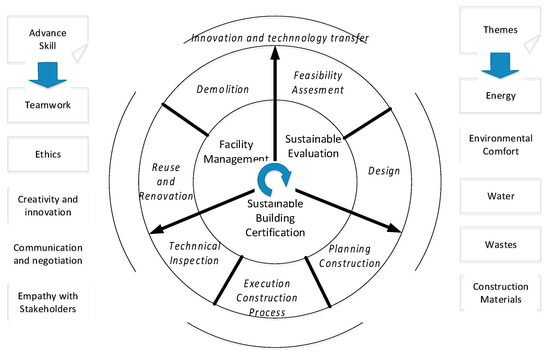
Figure 6.
A conceptual model for planning SC programs for engineering.
As result of the DACUM, surveys and interviews determine the three global competences (Sustainable Evaluation, Sustainable Construction Certification and Sustainable Facility Management) that are developed during the sustainable life cycle of the Construction project. Each global competition corresponds to one phase of the project’s life cycle. The sustainable evaluation stage considers the project’s conception, design using sustainability criteria, compliance assessment with sustainability criteria and its acceptance by the client. 68% of the respondents assigned the highest rating. The following stage (Sustainable Construction Certification) begins with the planning, materialization and sustainable certification of the infrastructure. Finally, the operation, maintenance and deconstruction of the building must be performed maintaining the sustainable development criteria. During each of these stages, the engineer must use technology innovation and transfer. All these stages are cyclical and end with the client and interested parties’ acceptance of the product of each phase. Finally, the construction professionals that meet the sustainability requirements must use advanced skills and master the issues of: energy, environment comfort, water, waste and building materials.
Table 4 and Table 5 describe the global competences and skills respectively, as determined in this research. The structure of description is based on the methodology described by Tobón [67,68]. The subskills are presented in Table 2.

Table 4.
Description of global competences in SC.

Table 5.
Sustainable construction skills for engineers.
The statistical analysis segments examined were: enterprise, government and universities, with a population size of 91, 27 and 20, respectively. Then, considering a 95% confidence level, the margin errors for business, government and universities are 5.2%, 3% and 10%, respectively; resulting in a total error margin of 5.3%. On the other hand, the exploratory factor analysis of major components found 7 categories which represent skills. In all skills the correlation coefficient was higher than 0.89 in the interobserver reliability and higher than 0.82 in intra-observer reliability. In the Design, Feasibility assesment and Execution construction process skills high correlations were found, except for the items: “Use of techniques for the calculation of thermal transmittances of buildings, in order to achieve the buildings’ thermal insulation, the reduction of financial resources and the use of energy by non-renewable sources” and “Apply the current regulations in sustainable projects, considering proper construction practices to comply with comfort and quality standards”, these were more related to the Design and Technical Inspection skills. In the global competences, the analysis made it possible to differentiate these. Finally, the internal consistency (Cronbach’s alpha) evaluation was higher than 0.75 for all items.
Figure 7 describes the degree of importance of the global competences and skills. These results emerge from the survey of professionals related to SC. Sustainable assessment should be addressed with greater emphasis in the curriculum. This is because engineering training in higher education focuses on project design and evaluation. In this case the feasibility assessment was more important than the design. Further, the global competition for sustainable construction allows the engineer to carry out energy assessments of homes as presented by some authors [83,84].
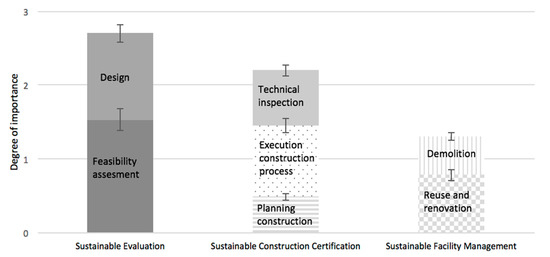
Figure 7.
Degree of importance of the global competences and skills.
On one hand, advanced skills and their degree of importance were established according to all the professionals involved in the DACUM, surveys and interviews (Figure 8). Interdisciplinary integration that must be addressed with greater emphasis in the program is observed. This is because the professionals mainly involved in SC are architects, engineers, and technicians of different specialties: electricity, hydraulic, construction, chemical, mechanical and industrial. On the other hand, ethics become important because a professional with values and awareness of his/her contribution to SC in current environmental context is expected. For example in the area of sustainability, Seager and Selinger [85] described the challenge of sustainability ethics education and discusses a new initiative in the Rochester Institute of Technology regarding ethics education. Royal and Donnell [86] conclude that the role of education is instrumental in creating a community of practice which uses sustainability principles as a basis for investment decision making amongst business students, who will be the next generation of executives and financial analysts.
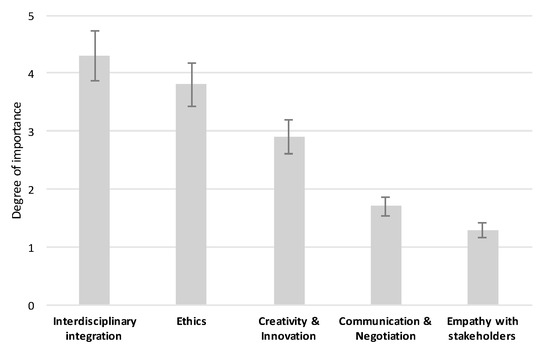
Figure 8.
Degree of importance of the advance skills.
The issues defined by the professionals consulted were: energy, environmental comfort, water, waste and construction materials (Figure 9). All of this, according to what is proposed by the different sustainable building certification methodologies: Building Research Establishment Environmental Assessment Methodology (BREEAM), Leadership in Energy and Environmental Design (LEED), Comprehensive Assessment System for Built Environment Efficiency (CASBEE), Green Globes, among others. Energy turns out to be basic theme of SC for the professionals in this study, it must ensure that projects (at different levels) consume minimal power or generate maximum energy through non-conventional renewable energies. Therefore, the professional must have knowledge in heat transfer and thermodynamics. Then, there is the environmental comfort that is of great importance, since SC professionals must achieve a healthy built environment, based on the room’s air that meets the temperature and humidity limits defined as thermal comfort, along with adequate ventilation, acoustic insulation and brightness. Lastly, the water issue is approached from a perspective of optimal resource use, avoiding contamination. On the other hand, a professional must be trained to avoid generating non-recyclable waste and devise alternatives for the reuse of waste linked to a construction project. The latter ratifies what was published by Gomez-Soberon et al. [87]. Finally, a topic that cannot be left out is the construction materials, since the professional must be able to use them efficiently and innovate in new materials [88,89,90] that can improve the envelope of constructions that tends to adiabatic building.
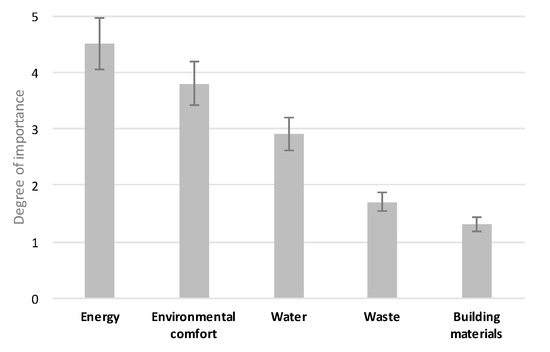
Figure 9.
Degree of importance of the relevant themes.
4. Discussions
The methodology followed in this work responds to what was reported by Vásquez [91]: the construction skills cannot be performed in isolation, but it must be done from a flexible and permanent education, from an explicit theory of cognition, within the conceptual institution framework, in a cultural, social, political and economic environment.
The Sustainable Project Design global competence is the most important. Continuing in the order of importance is construction and operations management. Training engineers in SC must cover the entire life cycle, corroborating what has been described by other authors [2,41,43,92]. In addition, training in SC must be based on the incorporation of economic, social and environmental dimensions (triple bottom line) in projects. This is achieved with the early, articulated and integrated inclusion, aimed at stimulating critical thinking in systemic interaction of environmental, social, and economic factors; and the need to commit to sustainable development [43,92,93,94,95,96]. The latter being articulated with advanced skills.
According to advanced skills in this research, it is expected that the professionals trained in SC must be able to Work in a Team in a collaborative way, since SC projects consider the contribution of different specialties, such as, for example: civil, electrical, mechanical, chemical, hydraulic, and economical works. The intervals of the results of the degree of importance of: teamwork in a collaborative and ethical way, cross paths. This is consistent with what was answered in the personal interviews with the experts, since they emphasized that both advanced skills must be synergistic.
Five relevant issues that should be treated according to the level of skill required, within the importance detected in this research are declared. All of these issues are in accordance with the different sustainable building certification methodologies (BREEAM, LEED, CASBEE, Green Globes, among others). The Energy topic is considered of greater importance because the main purpose of SC is to optimize the energy use without compromising quality of life, which is why Thermal Comfort was the second relevant issue.
It is proposed that the training of engineers in SC should be based on the courses: Design, Feasibility Assessment, Technical Inspection, Execution Construction Process, Planning Construction, Reuse and Renovation and Demolition. Each of these courses should address issues of: Energy, environmental comfort, water, wastes and construction materials. In addition, consider transversal training in: Interdisciplinary integration, ethics, creativity and innovation, communication and negotiation and empathy with stakeholders. The contents and activities of the courses must be based on the sub competences set out in Table 2. All the above according to the degree of importance detected in this research.
Finally, technology innovation and transfer must be present in all SC training, because during the course of all the research stages, the need to train engineering capable of adapting to current engineering challenges appeared. This study reaffirms what Yepes [1] described: the growing complexity of the construction industry forces professional engineers to evolve and adapt.
5. Conclusions
The role of the engineer in SC goes beyond the realization of construction projects. The engineer must be involved from the feasibility study of an idea to the work’s deconstruction, planning the reuse of resources. Therefore, the training of engineers is of vital importance. This article provides guidelines to be followed by any higher education institution that trains engineers in sustainable construction. The degrees of importance of: the themes, advanced skills and global competences for the training of engineers in sustainable construction are presented.
The skills obtained with the methodology followed in this investigation, represent the construction areas in which engineers can evolve as professionals. The most important global competence for an engineer is Sustainable Project Design. Then, as part of this global competition, the Sustainable Feasibility Assessment becomes important. A project that has a high quality design will avoid serious errors in later stages. All this considering the seven principles and the balance between social, economic and environmental aspects.
Advanced skills should developed by the engineering study programs for SC according to the order of least importance are: teamwork in a collaborative way, ethics, creativity and innovation, communication and negotiation skills and empathy with stakeholders. Note that the results validate that collaborative teamwork must be performed synergistically with ethics.
The training of the engineer in SC should consider the five major issues. The results allowed ordering them from greatest to least importance: energy thermal comfort, water, waste and construction materials. Emphasize that energy and comfort issues should be addressed in a synergistic manner for building studies.
Finally, in terms of future research, the evaluation with the proposed model of the study programs of the universities with the best Qs ranking is considered. The breadth and depth to address global competencies, skills and relevant issues will be measured. In addition, it is expected to determine the detailed contents of a program study for engineer training in SC.
SC should be considered of utmost importance in the current training of Chilean engineers. In the immediate future, it must be fully included in the curriculum. A future investigation is recommended to apply the proposed conceptual model to current engineering training programs, both national and international.
Author Contributions
Investigation, H.V. and C.C.; Writing-Review, F.M.
Funding
This research was funded by Agencia chilena de Eficiencia Energetica (AChEE) with project “Fortalecimiento de la formación en Construcción sustentable y Eficiencia Energetica”and the APC was funded by Universidad Catolica del Maule.
Acknowledgments
Thanks to Agencia chilena de Eficiencia Energetica for the funded delivered in project: “Fortalecimiento de la formación en Construcción sustentable y Eficiencia Energetica”. This was used to carry out this research. We would also like to thank all the professionals who participated in the DACUM, surveys and interviews.
Conflicts of Interest
The authors declare no conflict of interest. The funders had no role in the design of the study; in the collection, analyses, or interpretation of data; in the writing of the manuscript, and in the decision to publish the results.
References
- Yepes, V.; Pellicer, E.; Ortega, A.J. Designing a benchmark indicator for managerial competences in construction at the graduate level. J. Prof. Issues Eng. Educ. Pract. 2011, 138, 48–54. [Google Scholar] [CrossRef]
- Chau, K.W. Incorporation of sustainability concepts into a civil engineering curriculum. J. Prof. Issues Eng. Educ. Pract. 2007, 133, 188–191. [Google Scholar] [CrossRef]
- Caetano, N.; López, D.; Cabré, J. Learning sustainability and social compromise skills—A new track is born. In Proceedings of the 3rd International Conference on Technological Ecosystems for Enhancing Multiculturality, Porto, Portugal, 7–9 October 2015; pp. 525–528. [Google Scholar]
- Striebig, B.A. Building life cycle assessment skills with GREET and SimaPro to engage students in analyzing the sustainability of biofuel alternatives. In Proceedings of the 2017 ASEE Annual Conference and Exposition, Columbus, OH, USA, 25–28 June 2017. [Google Scholar]
- Kexin, Y.; Wanlong, L.; Ke, Y. Research on the skill teaching reform of higher vocational education from the perspective of sustainability: Case study of software college. In Proceedings of the ICCSE 2016—11th International Conference on Computer Science and Education, Nagoya, Japan, 23–25 August 2016; pp. 894–898. [Google Scholar]
- Heiskanen, E.; Thidell, Å.; Rodhe, H. Educating sustainability change agents: The importance of practical skills and experience. J. Clean. Prod. 2016, 123, 218–226. [Google Scholar] [CrossRef]
- Tarrant, S.P.; Thiele, L.P. Practice makes pedagogy—John Dewey and skills-based sustainability education. Int. J. Sustain. High. Educ. 2016, 17, 54–67. [Google Scholar] [CrossRef]
- McBain, B.; Phelan, L. Building students’ communication skills and understanding of environmental and sustainability issues interactively and cumulatively with Pecha Kucha presentations. In Learner-Centered Teaching Activities for Environmental and Sustainability Studies; Springer: Berlin, Germany, 2016; pp. 279–284. [Google Scholar]
- Ospino-Castro, A.; Silva-Ortega, J.I.; Muñoz-Maldonado, Y.; Candelo Becerra, J.E.; Mejia-Taboada, M.; Valencia-Ochoa, G.; Umaña-Ibañez, S. Innovation strategies to develop specific professional skills on photovoltaic systems using laboratory experience guides: Technologies and sustainability education. Espacios 2016, 37, 10–21. [Google Scholar]
- Truscheit, A.; Otte, C. Sustainable games people play: Teaching sustainability skills with the aid of the rol-play ‘NordWestPower’. Green. Manag. Int. 2004, 48, 51–56. [Google Scholar] [CrossRef]
- De la Riva, G.A.; Espinosa Fajardo, C.C.; Juárez Nájera, M. Sustainability in engineering education: An approach to reach significant learning and character skills. In Sustainability in Higher Education; Elsevier Ltd.: New York City, NY, USA, 2015; pp. 97–125. [Google Scholar]
- Helen Brain, R.G.; Thomas, B.H. Undergraduate students as sustainability consultants: Applying service-learning to enhance career skills and foster community environmental sustainability. Sustainability 2013, 6, 277–281. [Google Scholar] [CrossRef]
- Forment, M.A.; López, D.; Carracedo, F.S.; Almiñana, J.G.; Poch, J.P.; Velasco, M. Using a Crowdsourcing Knowledge Base to Support the Sustainability and Social Compromise Skill in Computer Science Engineering Studies. Commun. Comput. Inf. Sci. 2013, 278, 51–260. [Google Scholar]
- Kibert, C.J. Sustainable Construction. In Proceedings of the First International Conference of CIB TG 16, Tampa, FL, USA, 6–9 November 1994. [Google Scholar]
- Shen, L.; Tam, V.W.Y.; Tam, L.; Ji, Y. Project feasibility study: The key to successful implementation of sustainable and socially responsible construction management practice. J. Clean. Prod. 2010, 18, 254–259. [Google Scholar] [CrossRef]
- Tzikopoulos, A.F.; Karatza, M.C.; Paravantis, J.A. Modelling energy efficiency of bioclimatic buildings. Energy Build. 2005, 37, 529–544. [Google Scholar] [CrossRef]
- Eires, R.; Nunes, J.P.; Fangueiro, R.; Jalali, S.; Camões, A. New eco-friendly hybrid composite materials for civil construction. In Proceedings of the 12th European Conference on Composites Materials, Biarritz, France, 29 August–1 September 2016. [Google Scholar]
- Kibriya, T. Sustainable Construction—Use of masonry demolition waste in concrete. Gulustan–Black Sea Sci. J. Acad. Res. 2017, 38, 25–36. [Google Scholar]
- Inim, I.J.; Affiah, U.E.; Eminue, O.O. Assessment of bamboo leaf ash/lime-stabilized lateritic soils as construction materials. Innov. Infrastruct. Solut. 2018, 3, 32. [Google Scholar] [CrossRef]
- Herrera, M.; Soto, D. Renewable Insulation materials constructed from Colombian materials according to the principles of Sustainable Development: A review of possibilities. TECCIENCIA 2018, 13, 27–42. [Google Scholar]
- Srivastava, S.K.; Asthana, A. Study of Ecofriendly Light Weight Bricks using waste Paper—A Review. Carbon 2017, 5, 2. [Google Scholar]
- Vishwakarma, V.; Ramachandran, D. Green Concrete mix using solid waste and nanoparticles as alternatives—A review. Constr. Build. Mater. 2018, 162, 96–103. [Google Scholar] [CrossRef]
- Pérez-Fargallo, A.; Rubio-Bellido, C.; Pulido-Arcas, J.A.; Gallego-Maya, I.; Guevara-García, F.J. Influence of Adaptive Comfort Models on Energy Improvement for Housing in Cold Areas. Sustainability 2018, 10, 859. [Google Scholar] [CrossRef]
- Nicol, J.F.; Humphreys, M.A. Adaptive thermal comfort and sustainable thermal standards for buildings. Energy Build. 2002, 34, 563–572. [Google Scholar] [CrossRef]
- Rupp, R.F.; Vásquez, N.G.; Lamberts, R. A review of human thermal comfort in the built environment. Energy Build. 2015, 105, 178–205. [Google Scholar] [CrossRef]
- Taleghani, M.; Tenpierik, M.; Kurvers, S.; Van Den Dobbelsteen, A. A review into thermal comfort in buildings. Renew. Sustain. Energy Rev. 2013, 26, 201–215. [Google Scholar] [CrossRef]
- Halawa, E.; Van Hoof, J. The adaptive approach to thermal comfort: A critical overview. Energy Build. 2012, 51, 101–110. [Google Scholar] [CrossRef]
- Zomorodian, Z.S.; Tahsildoost, M.; Hafezi, M. Thermal comfort in educational buildings: A review article. Renew. Sustain. Energy Rev. 2016, 59, 895–906. [Google Scholar] [CrossRef]
- Singh, R.; Lazarus, I.J. Energy-Efficient Building Construction and Embodied Energy. In Sustainability through Energy-Efficient Buildings; CRC Press: Boca Raton, FL, USA, 2018. [Google Scholar]
- Shukla, A.; Sharma, A. Sustainability through Energy-Efficient Buildings; CRC Press: Boca Raton, FL, USA, 2018. [Google Scholar]
- D’Agostino, D. Improving Energy Efficiency in Buildings: Challenges and Opportunities in the European Context. In Sustainability through Energy-Efficient Buildings; CRC Press: Boca Raton, FL, USA, 2018. [Google Scholar]
- Mishra, S. Energy-Efficient Buildings: Technology to Policy and Awareness. In Sustainability through Energy-Efficient Buildings; CRC Press: Boca Raton, FL, USA, 2018. [Google Scholar]
- Chaturvedi, A.K.; Jain, S.; Gupta, D.; Singh, M. Advances in Energy-Efficient Buildings for New and Old Buildings. In Sustainability through Energy-Efficient Buildings; CRC Press: Boca Raton, FL, USA, 2018. [Google Scholar]
- Wang, Z.; Zhao, J. Optimization of Passive Envelop Energy Efficient Measures for Office Buildings in Different Climate Regions of China Based on Modified Sensitivity Analysis. Sustainability 2018, 10, 907. [Google Scholar] [CrossRef]
- Acosta, D.; Cilento Sarli, A. Edificaciones Sostenibles: Estrategias de investigación y desarrollo. Tecnol. Constr. 2005, 21, 15–30. [Google Scholar]
- Sartori, I.; Hestnes, A.G. Energy use in the life cycle of conventional and low-energy buildings: A review article. Energy Build. 2007, 39, 249–257. [Google Scholar] [CrossRef]
- Ramesh, T.; Prakash, R.; Shukla, K.K. Life cycle energy analysis of buildings: An overview. Energy Build. 2010, 42, 1592–1600. [Google Scholar] [CrossRef]
- Bustamante, W.; Bobadilla, A.; Navarrete, B.; Saelzer, G.; Vidal, S. Uso eficiente de la energía en edificios habitacionales. Mejoramiento térmico de muros de albañilería de ladrillos cerámicos. El caso de Chile. Rev. Constr. 2005, 4, 5–12. [Google Scholar]
- Milne, M.J.; Gray, R. Wither ecology? The triple bottom line, the global reporting initiative, and corporate sustainability reporting. J. Bus. Ethics 2013, 118, 13–29. [Google Scholar] [CrossRef]
- Lozano, R.; Ceulemans, K.; Alonso-Almeida, M.; Huisingh, D.; Lozano, F.J.; Waas, T.; Huge, J. A review of commitment and implementation of sustainable development in higher education: Results from a worldwide survey. J. Clean. Prod. 2005, 108, 1–18. [Google Scholar] [CrossRef]
- Lozano, R.; Lukman, R.; Lozano, F.J.; Huisingh, D.; Lambrechts, W. Declarations for sustainability in higher education: Becoming better leaders, through addressing the university system. J. Clean. Prod. 2013, 48, 10–19. [Google Scholar] [CrossRef]
- Ministerio de Obras Públicas (MOP); Ministerio de Vivienda y Urbanismo (MINVU); Ministerio de Energía (Minenergía); Ministerio de Medio Ambiente (MMA). Estrategia Nacional de Construcción Sustentable; Res. Ex. N 9035; MOP, MINVU, Minenergía, MMA: Santiago, Chile, 2013. [Google Scholar]
- Kevern, J.T. Green building and sustainable infrastructure: Sustainability education for civil engineers. J. Prof. Issues Eng. Educ. Pract. 2010, 137, 107–112. [Google Scholar] [CrossRef]
- Clevenger, C.M.; Ozbek, M.E. Service-learning assessment: Sustainability competencies in construction education. J. Constr. Eng. Manag. 2013, 139, A4013010. [Google Scholar] [CrossRef]
- Wiek, A.; Withycombe, L.; Redman, C.L. Key competencies in sustainability: A reference framework for academic program development. Sustain. Sci. 2011, 6, 203–218. [Google Scholar] [CrossRef]
- Frisk, E.; Larson, K.L. Educating for sustainability: Competencies & practices for transformative action. J. Sustain. Educ. 2011, 2, 1–20. [Google Scholar]
- Cebrián, G.; Junyent, M. Competencies in Education for Sustainable Development: Exploring the Student Teachers’ Views. Sustainability 2015, 7, 2768–2786. [Google Scholar] [CrossRef]
- Lozano, R.; Merrill, M.Y.; Sammalisto, K.; Ceulemans, K.; Lozano, F.J. Connecting Competences and Pedagogical Approaches for Sustainable Development in Higher Education: A Literature Review and Framework Proposal. Sustainability 2017, 9, 1889. [Google Scholar] [CrossRef]
- Aznar Minguet, P.; Ull Solís, M. La formación de competencias Básicas para el desarrollo sostenible: El papel de la universidad. Rev. Educ. 2009, 1, 219–237. [Google Scholar]
- McClelland, D.C. Testing for Competencies rather than intelligence. Am. Psychol. 1973, 28, 1–14. [Google Scholar] [CrossRef] [PubMed]
- Chomsky, N. Aspectos de la Teoría Sintaxis; Editorial Aguilar: Madrid, Spain, 1970. [Google Scholar]
- Bunk, G.P. La transmisión de las competencias en la formación y perfeccionamiento profesionales de la RFA. Rev. Eur. Form. Prof. 1994, 1, 8–14. [Google Scholar]
- Aznar Minguet, P. El reto Educativo de la Sostenibilidad en el marco del Espacio Europeo de la Educación Superior; Biblioteca Nueva: Madrid, Spain, 2006. [Google Scholar]
- García-Montalvo, J.; Mora, J.G. El mercado laboral de los titulados superiores en Europa y en España. Pap. Econ. Esp. 2000, 86, 111–127. [Google Scholar]
- Puyol, J. Análisis Ocupacional: Manual de Aplicación para Instituciones de Formación; Cinterfor: Montevideo, Uruguay, 1980. [Google Scholar]
- Bondehagen, D.L.; Komisar, S.J. Continuing assessment of sustainability skills in the environmental and civil engineering curriculum. In Proceedings of the 2017 ASEE Annual Conference and Exposition, Columbus, OH, USA, 25–28 June 2017. [Google Scholar]
- Maulida, N.I.; Firman, H.; Rusyati, L. Profile of Students’ Critical Thinking Skill Measured by Science Virtual Test on Living Things and Environmental Sustainability Theme. J. Phys. Conf. Ser. 2017, 812, 012058. [Google Scholar] [CrossRef]
- Sivapalan, S. Sustainability, blended learning and the undergraduate communication skills classroom: Negotiating engineering undergraduates’ expectations and perceptions. On Horiz. 2017, 25, 7–23. [Google Scholar] [CrossRef]
- Bondehagen, D.L.; Komisar, S.J.; O’Neill, R. Assessing achievement of sustainability skills in the environmental and civil engineering curriculum. In Proceedings of the 2017 ASEE Annual Conference and Exposition, Columbus, OH, USA, 25–28 June 2017. [Google Scholar]
- Hess, J.L.; Brownell, S.A.; House, R.A. Development and application of the sustainability skills and dispositions scale to the wicked problems in sustainability initiative. In Proceedings of the 2015 ASEE Annual Conference and Exposition, Seattle, WA, USA, 14–17 June 2015. [Google Scholar]
- Chandu, R.S.; Kancharla, N.A. Skill acquisition in engineering education for achieving sustainability. In Proceedings of the AICERA 2012—Annual International Conference on Emerging Research Areas: Innovative Practices and Future Trends, Kottayam, India, 19–21 July 2012. [Google Scholar]
- Gough, D.; Oliver, S.; Thomas, J. An Introduction to Systematic Reviews; Sage: Thousand Oaks, CA, USA, 2017. [Google Scholar]
- Popay, J.; Roberts, H.; Sowden, A.; Petticrew, M.; Arai, L.; Rodgers, M.; Duffy, S. Guidance on the Conduct of Narrative Synthesis in Systematic Reviews: A Product from the Esrc Methods Programme; Institute for Health Research: London, UK, 2006. [Google Scholar]
- Tranfield, D.; Denyer, D.; Smart, P. Towards a methodology for developing evidence-informed management knowledge by means of systematic review. Br. J. Manag. 2003, 14, 207–222. [Google Scholar] [CrossRef]
- Irigoin, M.; Vargas, F. Competencia Laboral: Manual de Conceptos, Métodos y Aplicaciones en el Sector Salud; Cinterfor: Montevideo, Uruguay, 2002; p. 252. [Google Scholar]
- Norton, R. DACUM Handbook, 2nd ed.; The Ohio State University: Columbus, OH, USA, 1997. [Google Scholar]
- Tobon, S. Formación Basada en Competencias; ECOE Ediciones: Bogota, Columbia, 2005. [Google Scholar]
- Tobón, S. Aspectos Básicos de la Formación Basada en Competencias; Proyecto Mesesup: Talca, Chile, 2006. [Google Scholar]
- Hernández Sampieri, R.; Fernández Collado, C.; Baptista Lucio, P. Diseños de Investigación; Metodología de la Investigación: Mexico City, Mexico, 2003. [Google Scholar]
- Kibert, C.J. Sustainable Construction: Green Building Design and Delivery; John Wiley & Sons: Hoboken, NJ, USA, 2016. [Google Scholar]
- Labuschagne, C.; Brent, A.C. Sustainable project life cycle management: The need to integrate life cycles in the manufacturing sector. Int. J. Proj. Manag. 2005, 23, 159–168. [Google Scholar] [CrossRef]
- Amini, M.; Bienstock, C.C. Corporate sustainability: An integrative definition and framework to evaluate corporate practice and guide academic research. J. Clean. Prod. 2014, 76, 12–19. [Google Scholar] [CrossRef]
- Bocken, N.M.; Short, S.W.; Rana, P.; Evans, S. A literature and practice review to develop sustainable business model archetypes. J. Clean. Prod. 2014, 65, 42–56. [Google Scholar] [CrossRef]
- Crawford, L. Leading Sustainability through Projects. In Sustainability Integration for Effective Project Management; IGI Global: Hershey, PA, USA, 2013; pp. 235–244. [Google Scholar]
- Akreim, M.A.; Suzer, O. Motivators for Green Buildings: A Review. Environ. Manag. Sustain. Dev. 2018, 7, 137–156. [Google Scholar] [CrossRef]
- Finocchiaro, L.; Lobaccaro, G. Bioclimatic Design of Green Buildings. In Handbook of Energy Systems in Green Buildings; Springer: Berlin, Germany, 2017. [Google Scholar]
- Spangenberg, J.H. Design for sustainability (DfS): Interface of sustainable production and consumption. In Handbook of Sustainable Engineering; Springer: Dordrecht, The Netherlands, 2013; pp. 575–595. [Google Scholar]
- Bovea, M.; Pérez-Belis, V. A taxonomy of ecodesign tools for integrating environmental requirements into the product design process. J. Clean. Prod. 2012, 20, 61–71. [Google Scholar] [CrossRef]
- Martínez, P.; González, V.; Da Fonseca, E. Integración conceptual Green Lean en el diseño, planificación, y construcción de proyectos. Rev. Ing. Constr. 2009, 24, 5–32. [Google Scholar]
- Gulati, R.; Kletter, D. Shrinking core, expanding periphery: The relational architecture of high-performing organizations. Calif. Manag. Rev. 2005, 47, 77–104. [Google Scholar] [CrossRef]
- Borges, M.; Benett, Y.; Lewis, M.; Thorn, M. An Expert System Approach to Curriculum Development in Engineering Education. Eur. J. Eng. Educ. 1994, 19, 175–189. [Google Scholar] [CrossRef]
- Callejón-Ferre, Á.J.; López-Martínez, J.A.; Carreño-Ortega, Á. Adaptación y desarrollo de la asignatura Motores y máquinas de la titulación de Ingeniero Técnico Agrícola en Industrias Agrarias y alimentarias ante el Espacio Europeo de Educación Superior. Rev. Form. Innov. Educ. Univ. 2010, 3, 141–151. [Google Scholar]
- Saldaña-Márquez, H.; Gómez-Soberón, J.M.; Arredondo-Rea, S.P.; Gámez-García, D.C.; Corral-Higuera, R. Sustainable social housing: The comparison of the Mexican funding program for housing solutions and building sustainability rating systems. Build. Environ. 2018, 133, 103–122. [Google Scholar] [CrossRef]
- Saldaña-Márquez, H.; Gómez-Soberón, J.M.; Arredondo-Rea, S.P.; Almaral-Sánchez, J.L.; Gómez-Soberón, M.C.; Rosell-Balada, G. The passivhaus standard in the mediterranean climate: Evaluation, comparison and profitability. J. Green Build. 2015, 10, 55–72. [Google Scholar] [CrossRef]
- Seager, T.P.; Selinger, E. Experiential teaching strategies for ethical reasoning skills relevant to sustainability. In Proceedings of the 2009 IEEE International Symposium on Sustainable Systems and Technology, Phoenix, AZ, USA, 18–20 May 2009. [Google Scholar]
- Royal, C.; O’Donnell, L. Education for sustainability: Creating skills in human capital analysis. J. Inf. Knowl. Manag. 2007, 6, 115–125. [Google Scholar] [CrossRef]
- Gómez-Soberón, J.M.; Gómez-Soberón, M.C.; Saldaña-Márquez, H.; Gámez-García, D.C.; Arredondo-Rea, S.P.; Corral-Higuera, R. Comparative by simulating the eventual waste generation of building indoor pavements construction. In Proceedings of the 2016 World Congress on Sustainable Technologies, London, UK, 12–14 December 2016; pp. 117–121. [Google Scholar]
- Cabrera-Covarrubias, F.G.; Gómez-Soberón, J.M.; Almaral-Sánchez, J.L.; Arredondo-Rea, S.P.; Gómez-Soberón, M.C.; Corral-Higuera, R. An experimental study of mortars with recycled ceramic aggregates: Deduction and prediction of the stress-strain. Materials 2016, 9, 1029. [Google Scholar] [CrossRef] [PubMed]
- Cabrera-Covarrubias, F.G.; Gómez-Soberón, J.M.; Almaral-Sánchez, J.L.; Arredondo-Rea, S.P.; Corral-Higuera, R. Mechanical properties of mortars containing recycled ceramic as a fine aggregate replacement. Rev. Constr. 2015, 14, 22–29. [Google Scholar] [CrossRef]
- Gómez-Soberón, J.M.; Gómez-Soberón, M.C.; Corral-Higuera, R.; Arredondo-Rea, S.P.; Almaral-Sánchez, J.L.; Cabrera-Covarrubias, F.G. Calibrating questionnaires by psychometric analysis to evaluate knowledge. SAGE Open 2013, 3, 1–14. [Google Scholar] [CrossRef]
- Vázquez, Y.A. Educación basada en competencias. In Educar Revista de Educación/Nueva Época; Universidad Iberoamericana Puebla: San Andrés Cholula, Mexico, 2001; pp. 39–61. [Google Scholar]
- Bukosky, M.; Montero, C.; Perez, D.; Bambill, E.; Amado, L. Educación Para el Desarrollo Sustentable en Ingeniería Civil de la FRBB-UTN. In Proceedings of the I Congreso Latinoamericano de Ingeniería, Entre Ríos, Argentina, 13–15 September 2017. [Google Scholar]
- Echenique, B.P. La enseñanza integral de la arquitectura, desde la perspectiva de la sostenibilidad ambiental. Módulo Arquitectura CUC 2016, 16, 35–58. [Google Scholar]
- The ImpEE Project. Improving Engineering Education; University of Cambridge: Cambridge, UK, 2006. (In Spinish) [Google Scholar]
- Garcia, F. El Patrimonio y las Normas de Certificación Sustentable en Arquitectura e Ingeniería Civil. Available online: http://www.icomos.org.ar/wp-content/uploads/2013/05/garciazuiga.pdf (accessed on 30 March 2018).
- Escobar, C.A.R. El componente energético en los programas de estudios de ingeniería ambiental. Rev. Clepsidra 2006, 2, 115–123. [Google Scholar]
© 2018 by the authors. Licensee MDPI, Basel, Switzerland. This article is an open access article distributed under the terms and conditions of the Creative Commons Attribution (CC BY) license (http://creativecommons.org/licenses/by/4.0/).

